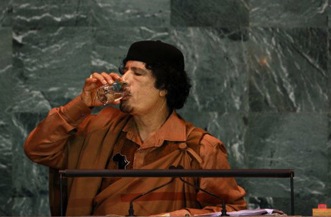UPDATES
The good oil Saikal
August 24, 2011 | Allon Lee

Some analysts just cannot help themselves.
Take ANU Professor Amin Saikal who has articles in today’s Age, the Australian Financial Review and on ABC’s Unleashed website playing an old favourite love song – Libya’s Colonel Gaddafi (or insert Middle East dictator’s name here) remained in power for so long because the West supported him for the oil.
Never mind that the dictator in question was frequently sanctioned by the West, not given any significant aid or sold substantial arms by most Western states, and generally viewed as something other than friend. There was trade and therefore the West was responsible for his rule.
Well, analysts like Saikal who peddle a predictable line in blaming the West for all the Middle East’s ills should note that Libyan rebels are unhappy, not with Western states but China, Russia and Brazil for abstaining from voting for the UN Security Council Resolution authorising NATO’s use of force to impose a no-fly zone in Libya.
Please don’t bother seeking out any references to China, Russia and Brazil in Saikal’s pieces; they aren’t even mentioned.
Check out this Guardian story showing how China’s main concern after Gaddafi’s demise is to ensure that the oil keeps on coming (My emphasis in bold).
China is seeking to reaffirm its ties with Libya as it looks ahead to a future without Gaddafi, calling for its investments to be protected after rebels suggested they might freeze out countries that had not supported them.
“China’s investment in Libya, especially its oil investment, is one aspect of mutual economic co-operation … and this co-operation is in the mutual interest of both the people of China and Libya,” a commerce ministry official told reporters on Tuesday. Wen Zhongliang, deputy head of the ministry’s trade department, added: “We hope after a return to stability in Libya, Libya will continue to protect the interests and rights of Chinese investors and we hope to continue investment and economic co-operation.”
His remarks came after an official at the Libyan rebel oil firm Agoco told Reuters: “We don’t have a problem with western countries like the Italians, French and UK companies. But we may have some political issues with Russia, China and Brazil.”
China abstained in the UN security council vote that authorised the Nato campaign, but then condemned the strikes and expressed “deep concern” about them.
Similarly, on Monday, Reuters‘ reported that Russia is bracing for the cold shoulder from Libya when things settle down:
Russian energy firms are likely to be barred from resuming work in Libya if NATO-backed rebels succeed in overthrowing Muammar Gaddafi, a Russia-Libya business group said on Monday.
“We have lost Libya completely,” Aram Shegunts, director general of the Russia-Libya Business Council, told Reuters.
This Reuters‘ story from today shows how Brasil is also seeking reassurances that its multibillion dollar investments in Libya will be safe.
Finally, globetrotting analyst Michael Totten, who spent some time in Libya offers this take on how Libyans feel about the West post-Gaddafi:
The people I met there on my visit in 2005 understood perfectly well our government and their government were mutually hostile, that the United States was their tyrant’s nemesis, that no blame whatsoever could be heaped on the West for the daily oppression they suffered.
Qaddafi’s sulfurous fulminations against the United States have been a constant longer than I’ve been alive. They likewise know perfectly well that the U.S. and NATO were instrumental in their liberation, that without us the Brother Leader of the Great Socialist People’s Libyan Arab Jamahiriya would still be their master.
None of this means Libyans will emerge as pro-American as the Albanians, the Kurds or the Israelis. They probably won’t. At this point, however, Russia and China need to worry much more than we do about being de-friended.
Meanwhile, media reports are suggesting that Venezuela’s President Hugo Chavez will offer Gaddafi asylum. The Guardian reports that:
President Hugo Chavez has visited Libya several times and a football stadium there was named in his honour.
Reuters reports on Chavez’s strong support for Gaddafi:
Venezuelan President Hugo Chavez said on Tuesday he will only recognise a Libyan government led by his friend and ally Muammar Gaddafi and accused the United States of inciting the country’s civil war.
Chavez, who has been the most vocal world leader to support Gaddafi, accused Western powers of riding roughshod over international law by backing Libya’s rebels in their revolt.
“This is kicking, spitting … on the most basic elements of international law,” he said. “Where are the international rights? This is like the caveman era.”
Certainly no one wants to see Gaddafi evade justice, and would not wish to saddle ordinary Venezuelans with his presence, but the two leaders make for a comfortable fit, with both renowned for long, rambling speeches, wild claims and nasty insults towards foreign leaders.
Allon Lee
Tags: Libya





